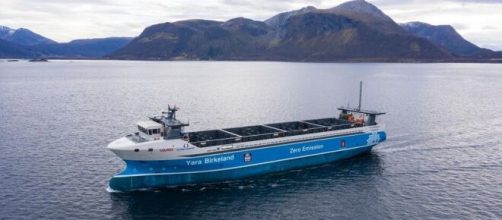NASA positioned crewless vehicles on Mars, and they have proved their worth. They rely on a combination of Artificial Intelligence, robotics, and renewable energy to deliver the goods. The scene could soon change to the seas once Norway launches its crewless cargo ship. It will become the first-ever zero-emission autonomous cargo ship in the world. Developed by a chemical company Yara International, the ship is the Yara Birkeland. Norway probably drew inspiration from the unmanned robots on Mars.
The maiden journey of the crewless ship has been tentatively set as the end of the year.
On its first journey, it would travel between two towns of Norway. Onshore data control centers would keep track of the ship’s movements. It would be a challenge for the team of experts because they would be treading a new path in sea travel.
Drones are crewless aerial vehicles
The credit of the first autonomous or crewless ship goes to Finland. It launched such a ferry in 2018. However, the Yara Birkeland can lay claim to being the first fully electric container ship. Its makers say the design of the crewless cargo ship enables the reduction of toxic pollutants. Moreover, the design ensures the elimination of harmful greenhouse gases and carbon dioxide. Another advantage is to move transportation of freight from land to water.
That would translate into less congestion on the roads and less burning of fossil fuels. International Maritime Organization reveals the shipping industry currently accounts for a certain percentage of emission of greenhouse gases. These results in Climate change, and arresting them would benefit the world. In February 2018, the U.S. Navy launched the prototype of a crewless drone ship.
Operating the crewless ship will be more cost-effective
It was in 2017 that the concept was born. The ship can accommodate more than 100 containers and travel at a speed of 13 knots. There will be high-power batteries. Jon Sletten is the plant manager for Yara's factory in Norway. To CNN, he explains that the charging of the batteries would be at the quayside prior to departure.
He estimates considerable savings in the number of truck journeys conducted annually by road. This would provide a greener option when compared to conventional cargo ships. Sletten adds that a crewless ship would be more cost-effective to operate. The original plan for the launch was last year, but there were delays. Apart from the Covid-19 pandemic, there were logistical challenges as well. There will be involvement of humans for the initial loading and unloading of the ship. That will gradually make way for automation in the areas of loading, discharging, and mooring operations. It will be necessary to develop equipment like cranes and straddle carriers for positioning containers onto ships.
Rudy Negenborn is a professor at a university in the Netherlands. In his opinion, vessels like the Yara Birkeland are the future. He hastens to add that there are many challenges ahead before autonomous ships can become a reality and launch commercial operations. This Norwegian ship could transport its first container this year in case of completion of all formalities.
The crewless ship could open up new opportunities
Yara International of Norway built the first zero-emission, crewless cargo ship. It could debut by the end of the year and make its voyage between two Norwegian towns. The ship depends on electrical power, and its design will help to reduce the emission of harmful gases in the shipping industry. That would be welcome in view of global concerns related to climate change. The project faced many uncertainties and challenges, and the ship is now waiting to make its first journey.


